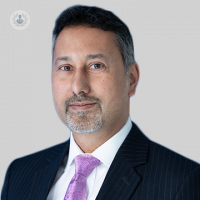Frequently asked questions about endoscopy: part 2
Written by:In the second article of a two-part series, esteemed consultant Professor Shahid Khan reveals the answers to more commonly asked questions about endoscopy, including risks and complications associated with the procedure.

Are there any risks or complications associated with gastroscopy and colonoscopy, and how common are they?
Gastroscopy and colonoscopy, both categorised as endoscopic procedures are generally considered to be low-risk compared to surgical interventions. While there are inherent discomforts, such as potential bloating and gas due to the introduction of air into the gut during the procedures, the main serious complications include perforation (puncturing a hole in the bowel lining) and bleeding. Perforation is rare, occurring in about one in several thousand procedures, and I have rarely encountered it in my 24 years of practice.
Textbook estimates suggest a risk of about one in a few thousand procedures. Similarly, the risk of bleeding after biopsies or polyp removal is relatively low, around one in a thousand or one in two thousand procedures.
Other potential risks include sedation-related issues, such as excessive drowsiness or occasional instances of slowed breathing. However, it's important to note that the sedation drugs used are reversible. While extremely rare (about one in a thousand cases), instances of a strong response to sedation can be promptly addressed with drugs that immediately reverse the sedative effects. The main concerns, perforation and bleeding, are relatively uncommon, and your endoscopist will thoroughly explain these risks before the procedure.
How often should individuals undergo routine endoscopic screenings for digestive health?
Endoscopy is not simply a standard procedure to evaluate digestive health; instead, it is a somewhat invasive intervention. Whenever an endoscopy is performed, it is crucial to have a valid reason, typically tied to symptoms or abnormal test results. For instance, if stool tests reveal traces of blood or markers of inflammation, an endoscopy may be required.
Indications that a patient may require a colonoscopy include symptoms such as changes in bowel habits, bleeding, traces of blood in the stool, unexplained anaemia, and weight loss. Additionally, it is employed for colon cancer screening, often recommended for individuals aged 50 and above, or earlier for those with a family history of colon cancer or certain genetic syndromes predisposing them to the disease. Furthermore, Polyps, which are precursors to colon cancer, can be detected and removed during screening, reducing the risk of developing malignancies.
Although there are limited scenarios for which screening is required, individuals with Barrett’s oesophagus, a condition where acid reflux induces changes in the lining of the food pipe, should undergo endoscopy every one to two years. This condition is relatively rare, but requires regular monitoring. Similarly, if someone has a stomach ulcer, a follow-up endoscopy is often recommended six to eight weeks later to ensure complete healing.
Apart from these specific cases, routine gastroscopies from the upper end are not generally indicated. Exceptions exist for individuals with certain liver conditions, such as cirrhosis, who may require periodic endoscopies every few years to check for swollen blood vessels called varices. In summary, while there are rare instances that warrant screening gastroscopies, they are not commonly recommended.
If you would like to book a consultation with Professor Khan, do not hesitate to do so by visiting his Top Doctors profile today.


